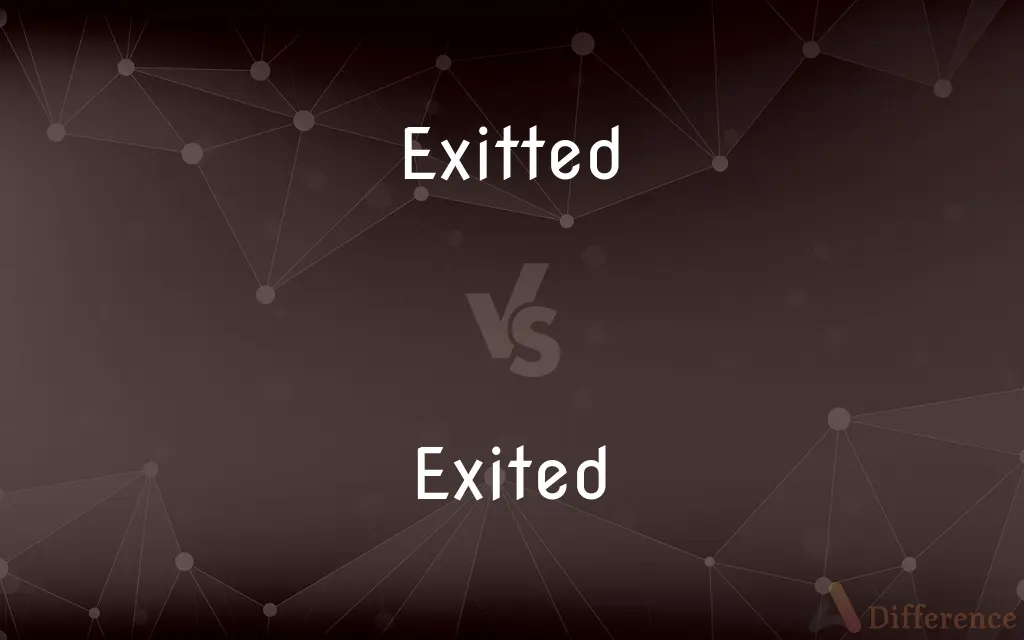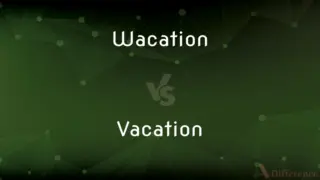Exitted vs. Exited — Which is Correct Spelling?
By Tayyaba Rehman — Updated on March 21, 2024
"Exitted" is a common misspelling. The correct spelling is "Exited," meaning to have left or departed from a place.

Table of Contents
Which is correct: Exitted or Exited
How to spell Exited?

Exitted
Incorrect Spelling

Exited
Correct Spelling
ADVERTISEMENT
Key Differences
"Exited" follows the rule of dropping the final 'e' before adding '-ed' to a verb.
Focus on the fact that not all verbs double their last consonant when forming the past tense.
Think of "Exit" + "-ed", without an extra 't'.
Consider the single 't' in "Exit."
Remember "Exit door," not "Exitt door."
ADVERTISEMENT
How Do You Spell Exited Correctly?
Incorrect: She exitted the room quietly, not wanting to disturb the meeting.
Correct: She exited the room quietly, not wanting to disturb the meeting.
Incorrect: They exitted the highway at the wrong exit and got lost.
Correct: They exited the highway at the wrong exit and got lost.
Incorrect: The crowd exitted the stadium, their cheers still echoing in the air.
Correct: The crowd exited the stadium, their cheers still echoing in the air.
Incorrect: After the movie, we exitted through the side door.
Correct: After the movie, we exited through the side door.
Incorrect: He exitted the application but forgot to save his work.
Correct: He exited the application but forgot to save his work.
Exited Definitions
Left a freeway or motorway.
She exited the highway at exit 45.
Completed a process or state.
The program exited without any errors.
Departed from a place or situation.
He exited the building quickly.
The act of going away or out.
A passage or way out
An emergency exit in a theater.
Took the second exit on the throughway.
The departure of a performer from the stage.
Death.
To make one's exit; depart.
To go out of; leave
Exited the plane through a rear door.
(Computers) To terminate the execution of (an application)
Exited the subroutine.
Simple past tense and past participle of exit
Left an involvement or situation.
The company exited the market last year.
Stopped participating in an activity.
He exited the race after the first lap due to injury.
Exited Meaning in a Sentence
The family exited the park just as it started to rain.
They exited the meeting with a clear plan of action.
Once he exited the building, he took a deep breath of fresh air.
She exited the relationship feeling stronger and more independent.
He exited the stage to thunderous applause.
The athlete exited the competition early due to an injury.
The band exited the scene just as they were becoming famous.
After reading the email, she exited the program and turned off her computer.
The tourists exited the museum, their minds full of new knowledge.
She exited the cab and walked into the busy street.
She exited the conversation feeling more confused than before.
She exited the party early, needing some time alone.
The bird exited the cage the moment the door was left open.
After a long day at work, he exited the office looking forward to the weekend.
They exited the negotiations without reaching an agreement.
He exited the deal feeling like he had made the right decision.
The students exited the classroom, eager for the weekend to start.
They exited the webinar with lots of ideas for their project.
The magician exited the stage, leaving the audience in awe.
The cat exited the room as quietly as it had entered.
Exited Idioms & Phrases
Exited the fray
To withdraw from conflict or competition.
Feeling overwhelmed, she exited the fray to find peace and quiet.
Exited to applause
To leave a situation or place while being applauded.
The performer exited to applause, thrilled with the positive response.
Exited the scene
To leave a particular social or professional scene.
After years in the limelight, the actor exited the scene to focus on personal projects.
Exited the field
To leave a field of play, especially in sports, due to injury or substitution.
After the injury, the player exited the field, greeted by a concerned silence.
Exited with dignity
To leave a situation gracefully, maintaining self-respect.
Despite the loss, the team exited with dignity, proud of their effort.
Exited, stage right
To leave, especially in a theatrical context, implying a planned or strategic departure.
After delivering his monologue, he exited, stage right, as the curtain fell.
Exited quietly
To leave without drawing attention to oneself.
He exited quietly from the party, not wanting to disturb the ongoing fun.
Exited stage left
To leave or disappear in a quiet, unobtrusive manner.
After making his point, he exited stage left, letting others continue the debate.
Exited in haste
To leave quickly, often due to an emergency or urgent need.
Upon hearing the alarm, everyone exited in haste, making their way to the nearest exit.
Exited in silence
To leave silently, often as a sign of respect or reflection.
The audience exited in silence, deeply moved by the performance.
Exited the partnership
To end a business or personal partnership.
After years of collaboration, she exited the partnership to pursue solo ventures.
Exited under a cloud
To leave amidst suspicion or disapproval.
The CEO exited under a cloud after the financial discrepancies were uncovered.
Exited the conversation
To leave a discussion, either physically or metaphorically.
Realizing the discussion was going nowhere, she exited the conversation to focus on more productive tasks.
Exited with honors
To leave or retire from a position with accolades or recognition.
After decades of service, she exited with honors, her contributions celebrated by all.
Exited on a high note
To leave at a peak moment or after a significant achievement.
He exited on a high note, retiring after winning the championship.
Exited with grace
To leave a situation in a manner that is elegant and poised.
Despite the controversy, she exited with grace, thanking everyone for their support.
Exited the orbit
To move away from the sphere of influence or control of a person, group, or situation.
Seeking independence, she exited the orbit of her mentor to forge her own path.
Exited the market
To withdraw from a market or business sector.
After several years of losses, the company exited the market to focus on more profitable areas.
Exited the race
To withdraw from a competition or electoral race.
Faced with insurmountable odds, he exited the race, endorsing his former rival.
Exited to mixed reviews
To leave a situation with both positive and negative feedback.
The play exited to mixed reviews, with critics divided on its merits.
Common Curiosities
What is the verb form of Exited?
The base verb form is "exit."
What is the root word of Exited?
The root word is "exit."
What is the singular form of Exited?
"Exited" is a verb, so it doesn't have a singular or plural form in the typical noun sense. The singular is "exit."
What is the plural form of Exited?
Not applicable as "Exited" is a verb in this context.
What is the pronunciation of Exited?
/ˈɛk.sɪ.tɪd/
Which vowel is used before Exited?
The vowel "i" is used in "exit."
Which conjunction is used with Exited?
Any conjunction can be used based on sentence structure.
Which preposition is used with Exited?
Often "from" or "through."
Which article is used with Exited?
Typically, "the" as in "the exited participants."
Why is it called Exited?
It derives from the verb "exit" meaning to leave or go out, with '-ed' denoting the past tense.
Is Exited an abstract noun?
No.
Is Exited a noun or adjective?
It's primarily a verb but can be used as an adjective in some contexts.
What part of speech is Exited?
It's primarily a verb.
What is another term for Exited?
Departed or left.
What is the first form of Exited?
Exit.
Is Exited a negative or positive word?
Neutral, but context can influence its connotation.
Is Exited a vowel or consonant?
"Exited" starts with a vowel sound.
Is Exited a countable noun?
Not typically, since it's primarily a verb.
Is Exited a collective noun?
No.
Is the word Exited a gerund?
No.
How many syllables are in Exited?
Three.
How is Exited used in a sentence?
"She exited the room before the meeting started."
Is the Exited term a metaphor?
Not inherently, but can be used metaphorically.
How do we divide Exited into syllables?
Ex-it-ed
What is the opposite of Exited?
Entered.
Which determiner is used with Exited?
Depending on context, determiners like "the" or "this" can be used.
What is the second form of Exited?
Exited.
Is Exited an adverb?
No.
Is the word Exited imperative?
No.
Is the word “Exited” a Direct object or an Indirect object?
It can be a direct object, e.g., "He exited the game."
What is a stressed syllable in Exited?
The first syllable "Ex" is stressed.
What is the third form of Exited?
Exited.
Share Your Discovery

Previous Comparison
Explotation vs. Exploitation
Next Comparison
Lein vs. LeanAuthor Spotlight
Written by
Tayyaba RehmanTayyaba Rehman is a distinguished writer, currently serving as a primary contributor to askdifference.com. As a researcher in semantics and etymology, Tayyaba's passion for the complexity of languages and their distinctions has found a perfect home on the platform. Tayyaba delves into the intricacies of language, distinguishing between commonly confused words and phrases, thereby providing clarity for readers worldwide.













































